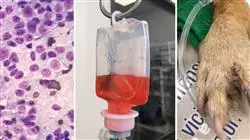University certificate
The world's largest faculty of veterinary medicine”
Introduction to the Program
A comprehensive, up-to-date and high-quality review of Veterinary Oncologic and Reproductive Pharmacology for professionals who aspire to excellence in their field"

Throughout this Postgraduate diploma, we will identify the therapeutic groups and their mechanisms of action and we will discuss, throughout the module, hormones and their therapeutic, regulatory, diagnostic and even fraudulent use.
The pharmacology of reproduction, gestation and parturition in different species, both production and domestic, will be discussed.
Anti-infective pharmacology is characterized by the study of drugs that have to act on cells other than those of the veterinary patient, which are intended to be eliminated in their entirety. They are capable of destroying or inhibiting the development of live germs that cause infections by acting through different pharmacological targets.
Antineoplastic pharmacology can act by destroying or inhibiting the development of tumor cells. TECH considers this module of great interest, due to the increasing incidence of neoplastic diseases in animals, with a greater emphasis on small animals.
A complete education in the use of veterinary drugs in cases of reproductive and oncological diseases"
This Postgraduate diploma in Veterinary Oncologic and Reproductive Pharmacology contains the most complete and up-to-date educational program on the market. The most important features include:
- Innovative and up-to-date diagnostic techniques in infectious diseases and their application in daily clinical practice, including the use of cytology as a diagnostic tool in these diseases.
- The most frequent and not so frequent pathologies of infectious origin in dogs from a practical and completely up-to-date point of view
- Infectious Pathologies oriented to the Feline Species, dealing extensively with all those of this species
- Vision "One Health", in which Zoonoses and their implications for public health will be reviewed
- Most frequent Infectious Pathologies of Dogs and Cats in the Tropics, with focus on Latin America. At present, there are no more exotic diseases and they should be included by the clinician in the differential diagnosis when the epidemiology allows to suspect them
- Prevention and management of all infectious diseases, including clinical, home and community settings
A revolutionary program for its ability to reconcile the highest quality of learning with the most complete online Education"
Its teaching staff includes professionals belonging to the field of Veterinary Medicine, who bring to this training the experience of their work, as well as renowned specialists from reference societies and prestigious universities.
The multimedia content, developed with the latest educational technology, will provide the professional with situated and contextual learning, i.e., a simulated environment that will provide immersive training programmed to train in real situations.
This program is designed around Problem-Based Learning, whereby the specialist must try to solve the different professional practice situations that arise throughout the program. For this purpose, the professional will be assisted by an innovative interactive video system created by renowned and experienced psychology experts.
A great opportunity for the veterinary medicine professional to advance his or her competencies and catch up on all the latest developments in pharmacological approaches"

Learn efficiently with a real qualification objective, with this Postgraduate diploma, unique for its quality and price, in the online teaching market"
Why study at TECH?
TECH is the world’s largest online university. With an impressive catalog of more than 14,000 university programs available in 11 languages, it is positioned as a leader in employability, with a 99% job placement rate. In addition, it relies on an enormous faculty of more than 6,000 professors of the highest international renown.

Study at the world's largest online university and guarantee your professional success. The future starts at TECH”
The world’s best online university according to FORBES
The prestigious Forbes magazine, specialized in business and finance, has highlighted TECH as “the world's best online university” This is what they have recently stated in an article in their digital edition in which they echo the success story of this institution, “thanks to the academic offer it provides, the selection of its teaching staff, and an innovative learning method aimed at educating the professionals of the future”
A revolutionary study method, a cutting-edge faculty and a practical focus: the key to TECH's success.
The most complete study plans on the university scene
TECH offers the most complete study plans on the university scene, with syllabuses that cover fundamental concepts and, at the same time, the main scientific advances in their specific scientific areas. In addition, these programs are continuously being updated to guarantee students the academic vanguard and the most in-demand professional skills. In this way, the university's qualifications provide its graduates with a significant advantage to propel their careers to success.
TECH offers the most comprehensive and intensive study plans on the current university scene.
A world-class teaching staff
TECH's teaching staff is made up of more than 6,000 professors with the highest international recognition. Professors, researchers and top executives of multinational companies, including Isaiah Covington, performance coach of the Boston Celtics; Magda Romanska, principal investigator at Harvard MetaLAB; Ignacio Wistumba, chairman of the department of translational molecular pathology at MD Anderson Cancer Center; and D.W. Pine, creative director of TIME magazine, among others.
Internationally renowned experts, specialized in different branches of Health, Technology, Communication and Business, form part of the TECH faculty.
A unique learning method
TECH is the first university to use Relearning in all its programs. It is the best online learning methodology, accredited with international teaching quality certifications, provided by prestigious educational agencies. In addition, this disruptive educational model is complemented with the “Case Method”, thereby setting up a unique online teaching strategy. Innovative teaching resources are also implemented, including detailed videos, infographics and interactive summaries.
TECH combines Relearning and the Case Method in all its university programs to guarantee excellent theoretical and practical learning, studying whenever and wherever you want.
The world's largest online university
TECH is the world’s largest online university. We are the largest educational institution, with the best and widest online educational catalog, one hundred percent online and covering the vast majority of areas of knowledge. We offer a large selection of our own degrees and accredited online undergraduate and postgraduate degrees. In total, more than 14,000 university degrees, in eleven different languages, make us the largest educational largest in the world.
TECH has the world's most extensive catalog of academic and official programs, available in more than 11 languages.
Google Premier Partner
The American technology giant has awarded TECH the Google Google Premier Partner badge. This award, which is only available to 3% of the world's companies, highlights the efficient, flexible and tailored experience that this university provides to students. The recognition as a Google Premier Partner not only accredits the maximum rigor, performance and investment in TECH's digital infrastructures, but also places this university as one of the world's leading technology companies.
Google has positioned TECH in the top 3% of the world's most important technology companies by awarding it its Google Premier Partner badge.
The official online university of the NBA
TECH is the official online university of the NBA. Thanks to our agreement with the biggest league in basketball, we offer our students exclusive university programs, as well as a wide variety of educational resources focused on the business of the league and other areas of the sports industry. Each program is made up of a uniquely designed syllabus and features exceptional guest hosts: professionals with a distinguished sports background who will offer their expertise on the most relevant topics.
TECH has been selected by the NBA, the world's top basketball league, as its official online university.
The top-rated university by its students
Students have positioned TECH as the world's top-rated university on the main review websites, with a highest rating of 4.9 out of 5, obtained from more than 1,000 reviews. These results consolidate TECH as the benchmark university institution at an international level, reflecting the excellence and positive impact of its educational model.” reflecting the excellence and positive impact of its educational model.”
TECH is the world’s top-rated university by its students.
Leaders in employability
TECH has managed to become the leading university in employability. 99% of its students obtain jobs in the academic field they have studied, within one year of completing any of the university's programs. A similar number achieve immediate career enhancement. All this thanks to a study methodology that bases its effectiveness on the acquisition of practical skills, which are absolutely necessary for professional development.
99% of TECH graduates find a job within a year of completing their studies.
Postgraduate Diploma in Veterinary Oncologic and Reproductive Pharmacology
.
The Postgraduate Diploma in Veterinary Oncologic and Reproductive Pharmacology from TECH Global University is your opportunity to excel in the field of veterinary medicine. Through our online classroom program, you will be able to acquire specialized knowledge in pharmacology for the treatment of oncological and reproductive diseases in animals. We understand the importance of quality learning that adapts to your needs and schedule. Our online classroom program gives you the flexibility to study from anywhere and at any time, allowing you to advance in your career without interrupting your daily responsibilities. During the 6-month program, you will thoroughly explore the principles of veterinary pharmacology and its application in the treatment of oncologic and reproductive diseases in animals.
All you need to know about the principles of veterinary pharmacology and its application in the treatment of oncologic and reproductive diseases in animals.
Acquire specialized knowledge in veterinary pharmacology through our online classes.
.
When you enroll in the Postgraduate Diploma in Veterinary Oncological and Reproductive Pharmacology, you will be supported by a highly trained and experienced teaching team in the field of veterinary pharmacology. They will guide you throughout the program, providing you with up-to-date knowledge and personalized advice so that you become a competent professional in the treatment of oncological and reproductive diseases in animals. Upon completion of this specialization, you will be prepared to meet the challenges posed by oncologic and reproductive diseases in animals. You will be able to develop effective therapeutic plans and improve the quality of life of your patients. Your dedication and expertise will make a difference in the well-being of animals and the satisfaction of their owners. Don't miss the opportunity to excel in the field of veterinary pharmacology and make a difference in the lives of animals and their owners. enroll today and advance your career!







